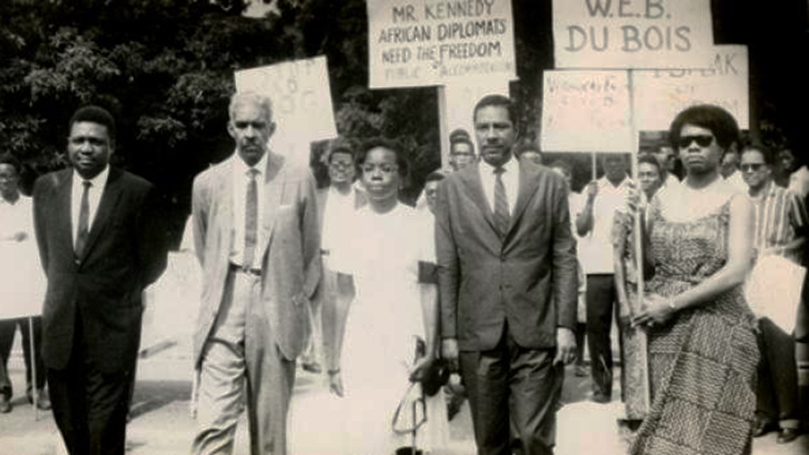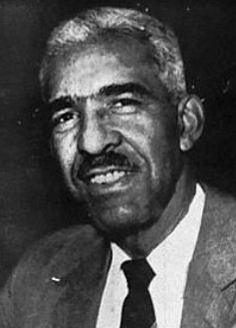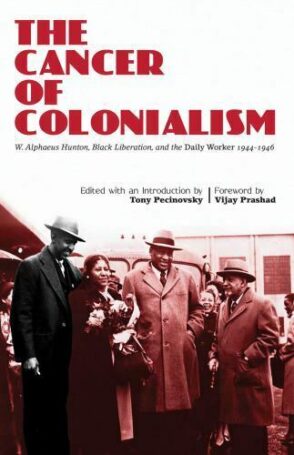
The Cancer of Colonialism: W. Alphaeus Hunton, Black Liberation, and the Daily Worker, 1944–1946, edited and with introduction by Tony Pecinovsky. New York: International Publishers, 2021. 355 pp., $19.99.
Political movements and activists seeking to serve the people move toward unity of purpose and action. Separate struggles come together. Beginning in the mid-1930s, W. Alphaeus Hunton was constantly widening the scope of his work and teaching. From a grounding in labor activism and the fight for racial and economic equality, he embraced national liberation in Africa and peace and cooperation among nations.
Hunton grew up in Brooklyn, his family’s refuge from racist violence in Atlanta. As professor of English literature at Howard University, he headed the effort to organize a faculty labor union. Anticipating the National Negro Congress (NNC), Hunton arranged for a large meeting at Howard. Anti-communists attacked him. That was in 1935, the year before he joined the U.S. Communist Party (CPUSA). In 1936 he organized the first national conference of the NNC, a Communist-led Popular Front organization. As suggested by historian and labor educator Tony Pecinovsky, “The CPUSA was the only organization on the left to make African-American equality a centerpiece of its work.”
The central theme of Pecinovsky’s new book is Hunton’s contribution, now mostly forgotten, to ongoing resistance against economic and political oppression of Africans and African Americans alike. Hunton’s internationalist perspective was exemplary. The book, The Cancer of Colonialism, is clearly written, well-organized, and full of information. Detailed footnotes are a side benefit.
The book’s first section, modestly labeled “Introduction,” is a stand-alone resource. It covers intersecting historical features of the inter-war, wartime, and post–World War II periods. Figuring prominently are national liberation struggles playing out in Africa, Vietnam, Indonesia, the Philippines, and Korea. The author traces the twists and turns of U.S. Communists in dealing with racism at home and independence struggles abroad.
The reader learns how the Communist International, and later the Soviet Union, stimulated, prodded, facilitated, and provided material support for national liberation struggles. The author cites the complicity of U.S. imperialism with mass murders, take-downs of newly independent governments, harassment of liberation movements, and anti-communist provocations. He touches upon the prolonged debate within the CPUSA as to whether African Americans constitute an oppressed nation.
Spreading the word
The second section of Pecinovsky’s book tells about Hunton’s political life. From 1936 on, he organized national conventions for the NNC, edited its publications, and planned education programs. Hunton gained recognition nationwide and in Washington as a leader in opposing racial discrimination and police violence against Black people.
With chapters in 26 cities, the NNC established the Southern Negro Youth Congress that would in turn set up chapters in 11 southern states and recruit more than 10,000 members. Both organizations were typical of Popular Front groups promoted by the CPUSA. Joining were Communists and, according to the author, “anyone willing to fight for workers’ rights and African American equality.” The Communist International had launched its popular-front strategy in 1935 to fight fascism.
 Under fire from anti-communists, Hunton in 1941 was forced to testify before the House Un-American Activities (“Dies”) Committee. He resigned his professorship at Howard in 1943. The NNC merged with the CPUSA-backed Civil Rights Congress (CRC) in 1947, and then disappeared.
Under fire from anti-communists, Hunton in 1941 was forced to testify before the House Un-American Activities (“Dies”) Committee. He resigned his professorship at Howard in 1943. The NNC merged with the CPUSA-backed Civil Rights Congress (CRC) in 1947, and then disappeared.
Alphaeus Hunton was “the administrative and intellectual mainstay” of the Council on African Affairs (CAA) between 1942, when it began, until its demise in 1955. Paul Robeson was the organization’s co-founder and chairperson and W. E. B. Du Bois its vice chairperson. According to Pecinovsky, the CAA “brought together African Americans fighting for equality with Black liberation movements in Africa while both sought allies within ascendent socialism.” Historian Gerald Horne regards the CAA as “the vanguard organization in the U.S. campaigning against colonialism.”
Hunton was the CAA’s education director. He edited and wrote for its publications, organized events, mentored young activists, arranged for humanitarian aid deliveries to Africa, and, with Paul Robeson, was a “fixture” at the United Nations. Time and again, he returned to South Africa’s freedom movement.
Anti-communist harassment was a constant. Having refused to provide federal investigators the names of donors to the CRC bail fund, Hunton went to prison for six months in 1951. Rather than turn over CAA correspondence to the government in 1955, Hunton dissolved the organization.
Daily Worker
The Cancer of Colonialism concludes with a collection of columns Hunton wrote for the Daily Worker from July 20, 1944, to January 19, 1946. A present-day reader of the columns becomes his or her own historian in tracing a transition from optimism to frustration.
Vice President Henry Wallace is quoted as anticipating “freedom everywhere … under just and democratic principles.” Hunton applies the example of the Soviet Union to the problem of colonies. What Britain failed to do in 100 years, he notes, the USSR did in 25 years.
Hunton anticipates that the United States, Britain, and Soviet Union would collaborate in shaping a new world and the new United Nations. The worldwide labor movement in the works would help out.
He praises Churchill and Roosevelt’s Atlantic Charter agreement (1941) and the outcome of the Teheran and Yalta conferences in 1943 and 1945, when Stalin joined the other two. He assumes that agreements on the right of all nations to self-government and on collaboration in securing world peace would last.
 Hunton lauds conferences in 1944 at Dunbarton Oaks and Bretton Woods where new trade and financial arrangements were fashioned that, as he expected, would assure the development even of small nations.
Hunton lauds conferences in 1944 at Dunbarton Oaks and Bretton Woods where new trade and financial arrangements were fashioned that, as he expected, would assure the development even of small nations.
He reports on the 1945 San Francisco conference and the agreement there on a United Nations Charter. He offers several columns on South Africa, where the job remained of “liquidating fascism.”
In later columns, Hunton grows uncertain. He sees colonialism returning to Korea, Indonesia, Malaya, and Indochina (think Vietnam). He critiques U.S. aggressiveness in demanding to exercise its UN-sanctioned trusteeship over Japanese islands and the Pacific islands that had hosted allied bases. Signs crop up of U.S. anti-Soviet hostility. The Cold War is beginning.
Finally, Hunton comments on a Daily Worker article by William Z. Foster titled “Leninism.” Having returned to head the CPUSA, Foster, as quoted by Hunton, mentions “dangerous illusions as to exaggerated possibilities” associated with “New Dealism” (Hunton’s term). Hunton cites “reformist illusions [that] act as, [in Foster’s words] a ‘barrier to the movement to socialism.’”
Hunton’s world had shifted. CPUSA leaders had shared his optimism, so much so that they had taken the CPUSA out of commission — which Foster’s return remedied. And Hunton’s expectation of continuing amity between the capitalist powers and the Soviet Union was faltering.
Ultimately, Pecinovsky’s narrative testifies to the commanding role of anti-communism in Hunton’s political life. Borrowing from analyst Michael Parenti, Pecinovsky writes that anti-communism is “the most powerful political force in the world.”
Hunton’s Daily Worker columns ended in 1944, but he continued to research and write. In 1957 he published Decision in Africa, which documents the economic exploitation by imperial powers and the emerging anti-imperialist and working-class struggles in the continent. He traveled to Ghana, the Soviet Union, and Guinea, where he taught and wrote. He moved to Ghana in 1962 to work on Du Bois’s Encyclopedia Africana. A CIA-assisted coup forced Hunton to leave Ghana in 1966 for Zambia. He died there in 1970 at the age of 67.
Pecinovsky deserves great credit for this book. It highlights Hunton’s central role in connecting struggles for justice in the United States, those of Black people in particular, with various liberation campaigns in Africa. In recalling this unsung hero, Pecinovsky reminds us of a hallmark of the Communist movement — its unflagging dedication to solidarity among working peoples of the world. The author’s new book, as with earlier ones, represents a steady effort on his part to remind us of the CPUSA’s long fight for justice and equality in the United States.
International Publishers also deserves credit for having presented not only The Cancer of Colonialism but also Hunton’s 1957 book Decision in Africa and Alphaeus Hunton: The Unsung Valiant, Dorothy Hunton’s 1986 biography of her husband.
Images: 1) Alphaeus Hunton, second from left in the foreground, along with Julian Mayfield, Alice Windom, W.A. Jeanpierre, and Maya Angelou Make, deliver a petition to the U.S. Embassy in Accra, Ghana, in 1963. New York Public Library. 2) Hunton, Findagrave.com.

 Join Now
Join Now